What has changed 10 years after Ireland's marriage referendum?
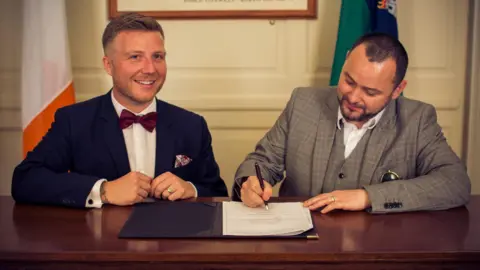 Michael Conlon
Michael ConlonIt is 10 years since people in the Republic of Ireland voted overwhelmingly to legalise same-sex marriage in an historic referendum.
On 22 May 2015, more than 62% voted in favour of amending the country's constitution to allow gay and lesbian couples to marry.
It was the first country in the world to legalise same-sex marriage through a popular vote.
Some 5,956 same-sex marriages have taken place since. BBC News NI has been speaking to some couples who tied the knot.
Civil partnership was a 'stepping stone'
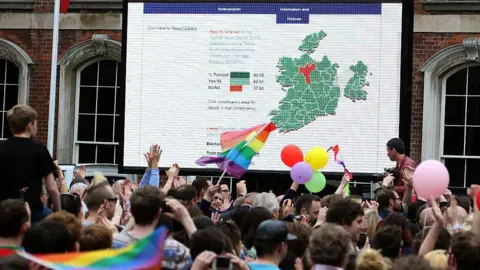 Getty Images
Getty ImagesSteven Smyrl and Roy Stanley have been together for more than 20 years, and they entered a civil partnership in 2011.
Steven said the couple recognised that step "would bring full equality, and it did".
"It paved the way for the enormity of the 'yes' vote," he said.
Roy said that when they entered their civil partnership, it allowed family members to attend - some of whom died before they would marry seven years later.
The vote on same-sex marriage in the Republic of Ireland was held 22 years after homosexual acts were decriminalised in the country.
It meant a marriage between two people of the same sex would have the same status under the Irish constitution as a marriage between a man and a woman.
Civil partnerships for same-sex couples had been legal in Ireland since 2010 - and this was the route many same-sex couples went down at first.
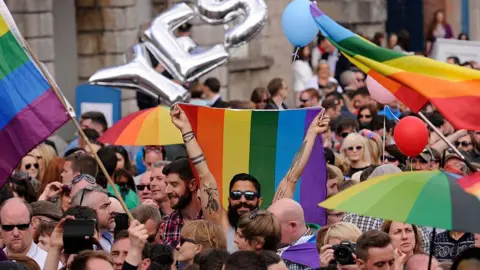 Getty Images
Getty ImagesCelebrations like 'winning world cup'
Michael Conlon, from Belfast, lived in the Republic of Ireland at the time of the referendum and was in a civil partnership with his now husband, Ger.
"I had always assumed civil partnership was pretty much it. You got all the rights as marriage and it turns out, in the south, that wasn't the case," he said.
Michael campaigned for a 'yes' vote in the build-up to the referendum.
He said the ensuing celebrations were like "Ireland had won the world cup".
"I suppose it was almost as if something so monumental had happened. It was like the country had won something.
"It was an experience I could not really put into words," he added.
At the time of the referendum, Ireland became the 20th country to legalise same-sex marriage; now there are 38 countries.
In total, 1,201,607 people voted in favour of same-sex marriage, while 734,300 voted against.
Out of 43 constituencies, only the largely rural Roscommon-South Leitrim had a majority of "no" votes.
For Roy and Steven, the referendum result was never in doubt.
"I think it was a surprise to everybody, including those that voted yes and and those that voted no, just the the size of the the majority in favour," said Steven.
The referendum campaign
Journalist Una Mullally told BBC News NI that the campaign for the referendum was the "culmination of many years of organising and protesting and activism".
"At times it felt like a pipe dream. The early protests were very small. It certainly wasn't on the political agenda.
"There was a lot of education and awareness and visibility and representation work to be done on the public agenda. So it was a long movement."
Una said the results made her feel "utter relief and happiness. I mean it was complete joy."
She added that it is a day she will "never forget."
Crediting the work people had put into it, she said: "All of the canvassing, all of the volunteering, all of the campaigning, it was just like this huge wave had fallen.
"I think the level of the result as well - that it wasn't marginal - so it was just this kind of safety and feeling that so many people were with the community."
'We love each other'
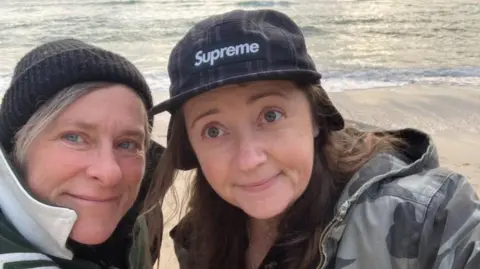 Una Mullally
Una MullallyMichael said that he and his now husband had not planned on getting married - until the involvement of a friend who was the then lord mayor of Dublin.
Their wedding happened in the Lord Mayor's official residence, The Mansion House in 2018.
"Because we'd done done the the big celebration in 2011, that [wedding] was a more select celebration.
"But the people who attended in 2011, a lot of them said to us... they'd never been to such a joyful wedding and that's partly because it just meant so much to everybody there, because it was something denied to us for so long," Roy said.
Una went to Las Vegas for her wedding to Sarah Francis, adding: "It was hard to even conceptualise getting married in a weird way, because, I guess, it didn't exist as a right for so long.
"But for that right to be recognised in the country where I'm from, where I grew up, where I live, it is profound in a rights' context."
Attitudes post referendum
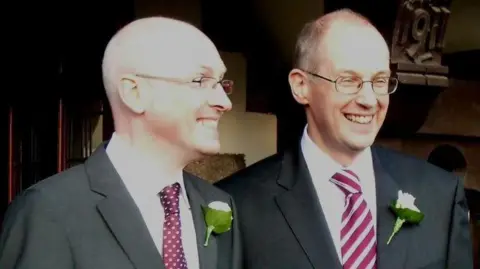 Roy Stanley
Roy StanleyAfter their marriage in 2018, Steven, was removed from his position as an elder with the Presbyterian Church in Dublin, which left them both "feeling really shaken".
"To dismiss me as an elder, and there's plenty of people would say, well, he knew what he was doing.
"Yeah, I knew what I was doing, simple as that. But, I love Roy with all my heart and there was absolutely no way that we were not going to be celebrating our marriage."
He added that he saw no theological inconsistency with same-sex marriage.
How have attitudes changed in 2025?
"Nobody really gives a second thought about the fact that two people with the same sex might want to get married," said Steven.
Una, however, said that bigotry can "find new avenues".
"There is a strange atmosphere that we're experiencing on this island and in so many other countries when it comes to resentment and grievance around minorities in general."
Michael and his husband have now moved back to Northern Ireland, where same-sex marriage wasn't legal until 2020.
He said the perception of gay people had been "for the most part really positive".
"Even some of the really religious people who are fundamentally against it, they're kind of more accepting of it," he said.
"They see that the sky didn't fall in, that they can still go to church, they can still pray, that none of their rights were taken away."
